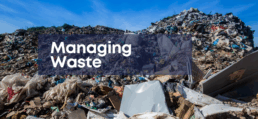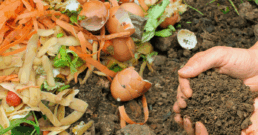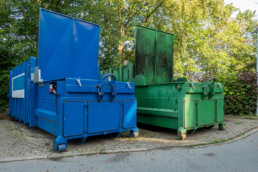Unlocking the insights of waste management
Managing waste responsibly is more than just a regulatory requirement, it’s a smart business move.
Every business generates a variety of waste types, from paper and plastics to electronics and food scraps. But do you know where your waste goes after it leaves your premises? Here we provide an overview of the main categories of waste commonly found in businesses, how each is collected, and what happens during the recycling process. Some processes may vary pending on types of waste, the supplier used.
Our goal is to help you identify your waste streams and make informed decisions that benefit both your business and the environment.
Paper and cardboard
- Collection: Separate bins for office paper, packaging, newspapers, and shredded documents. We can also arrange special waste collections for confidential waste.
- Recycling Process: Sorted to remove contaminants, shredded and mixed with water to create pulp, cleaned, refined, and pressed into new paper or cardboard products. Cardboard is often baled for efficient storage and transportation.
Plastics
- Collection: designated bins for different plastic types (e.g., PET, HDPE).
- Recycling Process: Plastics are sorted by type, cleaned, shredded, melted, and remolded into pellets for manufacturing new products. Some plastics require specialised recycling due to chemical composition.
Paper, cardboard, and plastics can also be collected together as part of our dry mixed recycling (DMR), where they are subsequently sorted and separated on-site. Download our DMR poster here.
Glass
- Collection: Separate containers for glass bottles, jars, and other glass items.
- Recycling Process: Glass is cleaned, sorted by color, crushed, and melted to form new glass products. Contaminants like ceramics or metals are removed during sorting.
Metals
- Collection: Bins for aluminum cans, steel, copper, and other scrap metals.
- Recycling Process: Metals are sorted, cleaned, melted, and reformed into new metal products. Aluminum and steel are among the most efficiently recycled materials.
Food and Organic Waste
- Collection: Separate bins for food scraps, coffee grounds, and biodegradable packaging. Download our Food Waste Poster.
- Recycling Process: Sent to composting facilities or anaerobic digestion plants to produce compost or biogas. This reduces landfill use and generates renewable energy.
Electronic Waste
- Collection: Special containers for computers, printers, mobile phones, and other electronics.
- Recycling Process: Electronic waste is dismantled, hazardous components are safely removed, and valuable metals and plastics are recovered for reuse.
Hazardous Waste
- Collection: Secure containers for chemicals, batteries (including e-cigarettes - vapes), fluorescent bulbs, and medical waste.
- Recycling/Disposal: Requires specialised handling and treatment to neutralise toxins, often through incineration, biological treatment to break it down, chemical treatment to make it non-hazardous, or specialised, secure landfill.
Construction and Demolition Waste
- Collection: Skips or bins for concrete, bricks, wood, glass, and metals.
- Recycling Process: Materials are sorted, cleaned, and reused in new construction projects or recycled into raw materials.
Implementation
- Waste Audits: Regularly analyse waste streams to identify reduction opportunities.
- Employee Training: Educate staff on proper sorting and recycling procedures.
- Technology Integration: Use smart bins and tracking software to optimise collection and recycling.
- Circular Economy: Design products for durability, repairability, and recyclability; implement take-back programmes.
- Compliance: Ensure full adherence to all regulations governing waste disposal and recycling. This is especially crucial following the introduction of Simpler Recycling.
Implementing these practices is not just about environmental stewardship it’s a strategic business decision that delivers financial, operational, reputational, and social benefits.
If you’d like more details or want a free audit of your business get in touch.
Anaerobic Digestion: Turning Food Waste into Valuable Renewable Resources
There are many ‘food waste’ processing units offered on the market. However, few can claim to process and transform food waste into valuable renewable resources, including renewable energy and a nutrient rich fertiliser.
Anaerobic digestion (AD) is a biological process that breaks down organic materials, such as food waste, in the absence of air. It is an environmentally friendly and sustainable method of recycling food waste.
By utilising anaerobic digestion plants, we can convert organic material into biogas, a versatile fuel that can power vehicles, generate heat and electricity, and be fed into the national grids. We can also use food waste and directly retain all the carbon and nutrient values, returning them to the soil as a fertiliser. This is especially important as, at the current rate, reports indicate that a significant portion of the world's soil is already degraded or at risk of degradation, with some projections suggesting that we will lose 50% of all fertile soils by 2050 due to the continued use of chemical fertilisation (harmful both in production and application), which is stripping our soil of its natural goodness.
Anaerobic digestion plants
Footprint Recycling collaborates with waste collectors who divert food waste to a network of anaerobic digestion (AD) plants across the UK. This network enables us to transport food waste to nearby plants, thereby minimising its carbon footprint.
Anaerobic digestion is a process where bacteria break down organic matter, such as food waste, in the absence of oxygen. As the bacteria consume the food waste, they produce biogas, which rises to the top of the digester. This biogas consists mainly of methane, the primary component of natural gas. The solid content of the food waste falls to the bottom of the digestion chamber and is extracted to create a nutrient-rich organic fertiliser.
How it works
In simple terms, the anaerobic digestion system functions much like a huge stomach. Like all stomachs, it requires regular feeding and a balanced diet to operate efficiently. To ensure the bacteria have the right recipe, the food waste must be prepared and any packaging removed. The process involves several steps:
- Collection of food waste
- Transport to AD plants
- Removal of packaging and preparation of food waste
- Feeding the digester with the prepared food waste
- Production of biogas and organic fertiliser.
The process and outcomes
Digesters come in various shapes and sizes, each with its unique characteristics. Getting the precise mix of nutrients to keep the micro bacteria well-nourished and efficient is an art. This can involve adding ingredients such as manure or other specific trace elements to the feedstock. Achieving the proper nutrient balance is essential for maximising the energy recovered from food waste.
Process:
- Hydrolysis: Food waste is mixed into a slurry and broken down into smaller molecules.
- Pasteurisation: The slurry is heated to 70°C to sterilise it.
- Acidogenesis: Compounds are transformed into volatile fatty acids in an oxygen-free environment.
- Acetogenesis: Fatty acids are broken down into acetates and hydrogen.
- Methanogenesis: Acetates and hydrogen are converted into methane and carbon dioxide.
Outcomes:
- Biogas: Methane is purified and injected into the national gas grid.
- Electricity: Methane is converted into electricity through combined heat and power units.
- Biofertiliser: The remaining digestate is used as a nutrient-rich biofertiliser.
Benefits of anaerobic digestion
Anaerobic digestion offers numerous environmental and economic benefits, making it a key player in sustainable waste management. Some of the key benefits include:
- Reduction of greenhouse gas emissions
- Minimise waste sent to landfills
- Generates renewable energy
- Supports sustainable agriculture
- Generation of nutrient-rich organic fertiliser supporting sustainable argriculture
- Contribution to the circular economy
- Improves waste management, reduces costs, ensures regulatory compliance and enhances sustainability.
And finally…
Anaerobic digestion is a powerful tool for transforming food waste into valuable renewable resources. By using a network of AD plants, we can efficiently convert organic material into biogas and organic fertiliser, reducing our carbon footprint and contributing to a sustainable future. Understanding the process and benefits of anaerobic digestion is crucial for advancing waste management practices and maximising the potential of food waste.
Footprint Recycling collaborates with waste collectors who divert food waste to a network of anaerobic digestion plants across the UK
Simpler Recycling Reform: Food Waste Disposal
As part of the Simpler Recycling Reform, it's now essential for businesses with more than 10 full-time employees (or equivalent) to follow the new regulations, including disposing of food waste separately. This includes tea bags, leftovers, out-of-date food, and more. Effective food waste management can significantly contribute to environmental sustainability and reduce landfill usage.
Why separate your food waste?
Separating your food waste can have numerous benefits:
- Environmental impact: Proper food waste disposal reduces methane emissions from landfills, significantly contributing to climate change.
- Resource recovery: Food waste can be composted, turning it into valuable nutrient rich soil that can be used in agriculture and gardening.
- Reducing landfill waste: By diverting food waste from landfills, you will also save money, as removing food from your general waste will significantly affect the amount you have to pay to dispose of it. It costs more in landfill taxes than it does to take food waste to an AD plant.
What can be disposed of as food waste?
To ensure the effectiveness and efficiency of the new food waste recycling regulations, following the guidelines about what items can be included and which should be avoided is crucial. This helps maintain the quality of the compost produced and prevents contamination.
- Fruit and vegetable scraps: peels, cores, and any other parts of fruits and vegetables.
- Meat and fish scraps: including bones and shells.
- Dairy products: cheese, yoghurt, and other dairy items.
- Bread and pastries: any baked goods.
- Eggshells: crushed or whole.
- Coffee grounds and filters: including tea bags.
- Leftover food: cooked or uncooked food remnants (including out-of-date food).
What shouldn't go in
- Metal: no metal items.
- Glass: glass containers or fragments are not permitted.
- Plastic: non-biodegradable plastic items.
- Hazardous waste: chemicals, batteries, and other hazardous materials.
- Pet waste: cat litter and animal faeces.
- Garden waste
- Non-compostable biodegradables: bioplastics that do not break down in compost.
What happens to food waste?
All of the food waste we collect is processed through anaerobic digestion facilities. This process generates renewable energy and produces organic fertiliser, resulting in greenhouse gas savings that are six times greater than composting.
What could be more rewarding than knowing that your food waste is being transformed into renewable biogas and electricity, making your premises more sustainable? It also produces organic fertiliser that enriches our soils and supports the growth of food.
Further Information
Food and drink waste hierarchy: deal with surplus and waste
Simpler recycling: workplace recycling in England
Or you can get in touch with us if you have any further questions.
How has your business adapted to the new Simpler Recycling Reform?
Almost a month in, how has your business adapted to the new Simpler Recycling Reform?
We’ve pulled together a quick round up of what’s what in the world of simpler recycling. As we all know the law in England around recycling recently changed, requiring businesses to recycle a core set of recyclable materials.
When did it happen?
- 31 March 2025 – for businesses with 10 or more full-time equivalent (FTE) employees.
- 31 March 2026 – Local authorities must collect all dry recyclable materials and food waste from households.
- 31 March 2027 – if you have fewer than 10 FTE employees in total across all of your premises.
- 31 March 2027 – Inclusion of plastic film packaging and plastic waste streams.
What needs to be recycled?
You should be recycling the following materials.
- Food waste
- Paper and card
- Plastic bottles, pots, tubs and trays, and cartons (cleaned for DMR)
- Metal tins and cans, foil and empty aerosols
- Glass bottles and jars
This is a legal requirement and ignoring the changes could result in compliance action being taken against your business.
Who should be following the new guidelines
All workplaces in England, including:
- Businesses
- Care homes
- Educational establishments
- Healthcare establishments
- Places of worship
- Penal institutes
- Charity shops
- Residential hostels
- Premises used for public meetings
Still unsure what you should be doing?
- Speak to Footprint Recycling or your waste collector to check if your current services meet the requirements or if you need to make any changes (waste audit).
- Tell your staff about any new processes and how to recycle correctly. This might include training sessions and internal campaigns, including signage on bins, posters, email footers, etc., as a reminder.
- Decide how frequently recycling and food waste collections should be, based on the amount of waste you produce.
Further information
You should check the government website for guidance.
Defra has funded the Waste and Resources Action Programme (WRAP) to develop the Business of Recycling Website . This provides guidance and resources for specific business sectors and non-domestic premises, such as schools and hospitals, on making the required changes.
Frequently Asked Questions
What is changing?
Recycling law has changed in England. All workplaces (businesses and relevant non-domestic premises) must recycle the same core materials.
Why is the UK Government making these changes?
The UK Government want to move to a future where we keep our resources in use for longer and reduce waste to landfill. Increased recycling and separate collection of food waste will help to reduce carbon emissions associated with waste and will support the nation's path to net zero.
What do I need to do?
You will need to ensure that your waste collection service arranges for recyclable materials to be collected separately from your general waste and present your waste in accordance with Simpler Recycling requirements. The recyclable waste streams are plastic, metal, glass, paper and card, and food waste, and you can find more details on what materials should be recycled in the Environment Act 2021
Do volunteers working at a premises count as Full Time Equivalent employees?
Volunteers are not included in determining an organisation's Full Time Equivalent employee count. This includes organisations that have volunteers across multiple premises.
Does the number of employees relate to per premise or the business?
Employment is measured per business, not per premise. Thus, multi-branch enterprises with over 10 FTE across various units must implement the changes and are not exempt.
My workplace has a combination of full and part-time staff. How do I know whether I fit in the micro-firm definition?
A business is a micro-firm if the number of full-time equivalent employees is less than ten. You can determine whether an organisation qualifies as a micro-firm by adding the number of full-time staff and a fraction based on pro-rata hours part-time staff members have worked in the qualifying 12-week period.
What will happen if I do not recycle correctly?
The Environment Agency will be able to issue a compliance notice against anyone who is a party to arrangements for collection made under section 45AZA or section 45AZB (industrial or commercial waste) of the Environmental Protection Act 1990 that is not compliant with the requirements.
Compliance notices can be issued against anyone not presenting the waste separately per the arrangements agreed with the waste collector. This will often be the waste producers (e.g. a business) but may also be, for example, landlords or facilities management companies presenting waste on behalf of the waste producer.
It is an offence to fail to comply with a compliance notice, and you may be liable to pay a fine on conviction.
I do not produce much food waste – do I still need a separate collection?
All workplaces producing food waste (including teabags etc.) will need to arrange for separate collection in accordance with the new Simpler Recycling requirements. This is regardless of the volume, and applies to all workplaces, not just those that serve/sell food or have catering facilities.
Workplaces have flexibility to decide on the frequency of collections to align with the volume of waste they produce, so it is possible to arrange for infrequent collections if this suits the needs of the workplace best. Workplaces could also consider sharing facilities with neighbouring premises where quantities are small, with the agreement of the neighbouring premises and the waste collector.
Do I need to provide recycling and food waste bins front of store for customers?
Workplaces will be required to present their waste for collection in accordance with the new requirements, however businesses won't be obligated to provide a bin for their customers. If businesses choose to provide bins, they will be required to separate out the waste collected where it is deemed to be relevant waste (waste which is similar in nature and composition to household waste) and present it according to their waste collection arrangement.
I'm a charity run by staff and volunteers. Do the new requirements apply to my organisation?
Yes. Simpler Recycling requirements will apply to all premises that produce household-like commercial waste (similar in nature and composition to household waste). This includes charities, and all relevant non-domestic premises, including those registered as charities.
We use a compost system for food waste. Is this still allowed?
You will be able to continue to compost your food waste. However, if you produce any additional food waste you do not compost yourself, you must arrange for this to be collected separately for recycling.
Businesses should take note of separate guidance on composting food waste at commercial premises, which can be foundon the Government website.
Is there any funding available for businesses to implement these changes?
No, businesses are expected to continue to pay for their waste management services. However, we will be providing advice and guidance for workplaces as they transition to compliance with the new recycling requirements.
Recycle Week 2024 - Rescue me! Recycle
It's Recycle Week (14-20 October), and this year, we're celebrating and highlighting items that can be recycled.
Recycle Week is the UK's biggest celebration of recycling, and for Recycle Week 2024, Footprint is joining an urgent crusade to save five packaging items from being thrown away and to keep them out of the bin by living a circular life through recycling.
The latest research from Recycle Now shows that while we are a nation of recyclers - nine out of ten people regularly recycle - nearly eight out of ten of us (79%) put one or more items into the bin that can be recycled.
We are supporting the 'Rescue Me – Recycle' campaign to raise awareness about the five types of packaging that need recycling: aerosols, trigger spray bottles, plastic pots, perfume bottles, and toilet roll tubes.
Recycling is essential to reducing the environmental impact of our purchases. By keeping these materials in circulation, we can lower emissions. While most people recycle, we need to ensure that everyone recycles everything they can, including every aerosol, trigger spray bottle, plastic pot, perfume bottle, and toilet roll tube. Rescue, recycle!
To learn more about the recycling process, visit Recycle Now. To find out what can be recycled in your area, enter your postcode into the Recycling Locator for instant information on recycling anywhere in the UK.
If you're a business looking to make a meaningful impact, join us in our 'Rescue Me – Recycle' campaign! Together, we can turn waste into sustainable solutions for our planet. Your contributions matter whether you're a small startup or an established business. Feel free to reach out if you want to learn how your business can play a pivotal role in this initiative. Let's collaborate for a greener future, drop us a line clare@footprint-recycling.com.
Starting from 6th April 2024, new regulations will be introduced in Wales that will require all non-domestic premises, such as businesses, charities, public sectors, and those who collect, keep, treat, or transport waste from non-domestic premises, to separate key recyclable materials.
Non-domestic premises must separate and present nine specified recyclable waste materials in a minimum of six separate recyclable waste streams. These materials are:
- glass
- cartons and similar, metal and plastic
- paper and card
- food waste from premises that produce 5 kilograms or more of food waste in seven consecutive days
- unsold small waste electrical and electronic equipment
- unsold textiles
Bans will also be in place from 6th April 2024, on the disposal of food waste to sewer from non-domestic premises, specified separate recyclable waste streams going to incineration plants and landfills, and all wood waste going to landfill.
These changes to the law aim to help the country work towards becoming a zero-waste nation and reducing carbon emissions by 2050. Separating and sorting recycling in workplaces should ensure greater volumes of high-quality recycling are produced and much less waste sent to landfill and for incineration.
Failure to comply with the separation requirements will be considered an offence, and there will be no upper limit on the courts' power to fine. Instead of criminal prosecution, a civil sanction may be issued for non-compliance with the separation requirements.
While we have a legal responsibility under the Environmental Protection Act 1990 'duty of care', should England adopt these more stringent regulations regarding separation of recyclable waste in order to achieve a greener future and promote sustainability? Many organisations in England currently do not have a waste strategy in place and do not separate recyclable waste from non-recyclable. However, commercial recycling plays a crucial role in ensuring sustainability. It is important for businesses to actively participate in these efforts.
For more detailed information about the Waste Separation Requirements (Wales) Regulations 2023, please refer to the Welsh Government code of practice. If you're a business and are looking to adopt a waste and recycling strategy get in touch.
As a business how can we support World Earth Day?
World Earth Day is an annual event celebrated on April 22nd to raise awareness and encourage action to protect the environment. It is a day to remind us of the importance of sustainable living and how we can make a difference in the world.
Businesses play a crucial role in the fight against climate change and can support World Earth Day in several ways.
Firstly, businesses can promote sustainable practices within their operations. For example, they can adopt environmentally friendly policies such as reducing waste, using renewable energy sources, and conserving water. They can also encourage employees to reduce their carbon footprint by using public transport or cycling to work. By taking such steps, businesses can reduce their environmental impact and help mitigate climate change.
Secondly, businesses can partner with environmental organisations to support their activities. For example, they can sponsor tree planting or countryside/beach clean-up activities. They can also donate to organizations that work to protect the environment or support research on climate change. Such partnerships can raise awareness of the environmental challenges facing our planet and encourage individuals to take action.
Thirdly, businesses can use World Earth Day to launch or promote sustainable products and services. They can showcase how their products are eco-friendly and sustainable and how they are contributing to the fight against climate change. This can be an excellent way for businesses to increase their brand visibility and promote their commitment to environmental sustainability.
Fourthly, businesses can organize events or campaigns that promote environmental sustainability. For example, they can organise a cycling or walking event to promote low-carbon transport. They can also organise educational campaigns that raise awareness of the importance of reducing waste or conserving energy. Such initiatives can help to mobilize people to take action and create a positive impact on the environment.
Lastly, businesses can support World Earth Day by promoting environmental sustainability in their supply chains. They can work with their suppliers to ensure they are also committed to sustainable practices. They can also encourage their customers to adopt eco-friendly practices and promote their sustainable products.
To conclude, businesses can play a vital role in supporting World Earth Day by adopting sustainable practices, partnering with environmental organizations, promoting sustainable products and services, organizing events and campaigns, and promoting environmental sustainability in their supply chains. By doing so, businesses can positively impact the environment and contribute to the fight against climate change. Ultimately, protecting our planet is a shared responsibility, and everyone, including businesses, must take action to ensure a sustainable future for generations to come.
We're just scratching the surface here, but If you're ready to move to become more sustainable, get in touch, and we'll be happy to review your waste management processes and carbon emissions.
Time to give the office a spring clean?
At this time of year, when preparing for the financial end of year, it's common to unearth files upon files of financial information and other documentation. However, it presents the perfect opportunity to declutter and reorganise your workspace for the year ahead.
Both financial and GDPR documentation is sensitive information and must be disposed of securely. If not, your company could be open to a security breach. In contrast, GDPR fines are a potential outcome of not complying with legal regulations when using and storing people's personal information.
Secure confidential paper shredding should be used when removing out-of-date financial information, personal information, and other sensitive information. Footprint Recycling offers a range of various services, both on and off-site, to suit most requirements when it comes to secure destruction, and we will provide an official Certificate of Destruction when we have completed the job so that you can feel safe in the knowledge that your documents have been securely destroyed, legally and ethically.
Whether you require regular, ad-hoc, or one-off confidential paper shredding services, we provide a compliant, highly professional, secure, convenient, and cost-effective solution to all your paper shredding.
If you would like to chat about paper shredding or recycling, please call us on 01484 660770 or email us.
PANTHER PARTNERS WITH FOOTPRINT RECYCLING TO TAKE SUSTAINABILITY PLEDGE TO THE NEXT LEVEL
Leading two-person white glove delivery specialist Panther Group has joined forces with total waste management firm Footprint Recycling to help them reduce their carbon footprint, taking them a step closer to achieving their Net Zero pledge.
In recent years, as a part of its ESG pledge, Panther has vastly increased its commitment to improving its environmental impact by keeping its waste unpolluted and to a minimum by following best practices. They have increased recycling measures, conserved energy more efficiently, and used environmentally friendly technologies.
To take its commitment one step further, the business has even set a target to implement a zero-waste culture throughout every aspect of its operations.
Having provided a comprehensive range of sustainable waste and recycling solutions to a wide range of sectors since 2008, Footprint Recycling is passionate about helping businesses manage their waste, reduce their carbon footprints and achieve their sustainability goals.
Since partnering with recycling specialist Footprint, Panther has greatly improved their recycling and environmental credentials. To date this year alone, Panther has recycled more than 453 tonnes of cardboard, plastic, and expanded polystyrene, 226 tonnes of general waste, 144 tonnes of TVs, and over 50,000 old mattresses collected and recycled on behalf of its customers and 25,000 tonnes of metal from washing machine bodies also recycled. The company’s carbon footprint by installing energy-efficient LED lighting throughout the depots has also improved by 60%.
And ever mindful of the need to provide a ‘green’ ethical service, Panther provides a furniture recycling service and closely adheres to the WEEE Directive.
Panther can now boast that 80 percent of its waste is recycled – with an aim to increase that figure to 90 percent over the next 12 months.
As part of its long-term sustainable energy programme the company is collaborating with Ev3power and is considering solar, wind turbine, and hydrogen options to power its operations and are also considering electric and hydrogen options for its fleet.
In recent weeks Panther has conducted a number of electric vehicle trials and now boasts a forklift fleet that is 60 percent electric.
Guy Burgess, Logistics Director commented: “With combatting climate change currently at the forefront of the global agenda, we have chosen to partner with Footprint Recycling to further improve our environmental impact and make a positive difference to our ecosystem.
“As a business, we are already making huge strides in making long-term and sustainable changes by pushing sustainability in every aspect of the business. Ingraining environmental consciousness within the company’s culture and Footprint Recycling will be a fundamental driver in helping us to facilitate this.
“No longer is it acceptable for companies to provide a 'sustainability statement' as consumers are far savvier and more discerning about how they spend their money and what businesses they’re willing to support and trade with.
“More than that though it’s vital that as a growing business we respond to the current climate crisis and act accordingly. The government has set a pledge for the UK to achieve Net Zero status by 2050, and as a company that strives for sustainability, we want to join the fight against global warming by driving down our environmental impact over the coming years.”
Robyn Brook, Founder & Chief Executive Officer, Footprint Recycling commented: “Our business is built on a foundation of helping our customers embrace the circular economy and improve their sustainability with a focus on achieving zero waste to landfill through recycling and reducing emissions.
“With pressure on businesses, like Panther, to do more to minimise their environmental impacts, our aim is not only to manage waste but to challenge the industry norms by developing processes bespoke to each client and introducing new ways to reduce, reuse and recycle.
“We’ve been working with Panther for several years, over which we have developed a fantastic relationship that allows us to continually strive and look at new ways to help them improve their environmental credentials and assist with their sustainability journey.”








